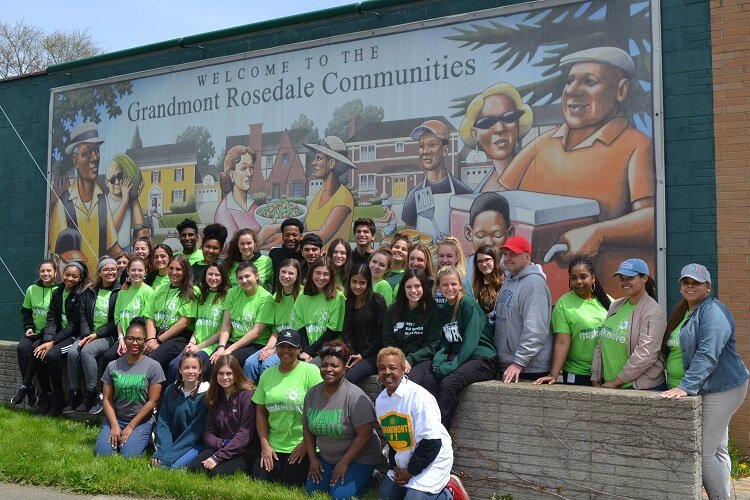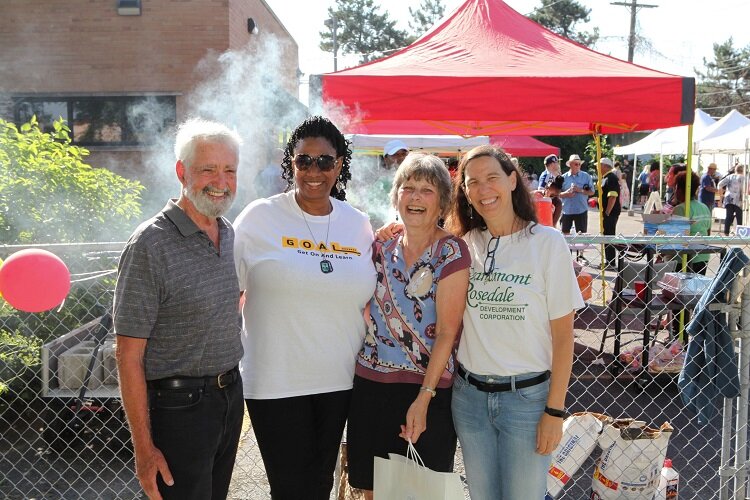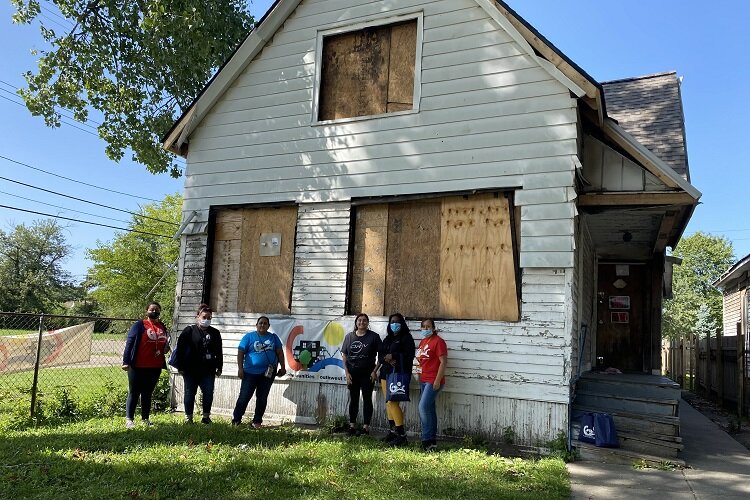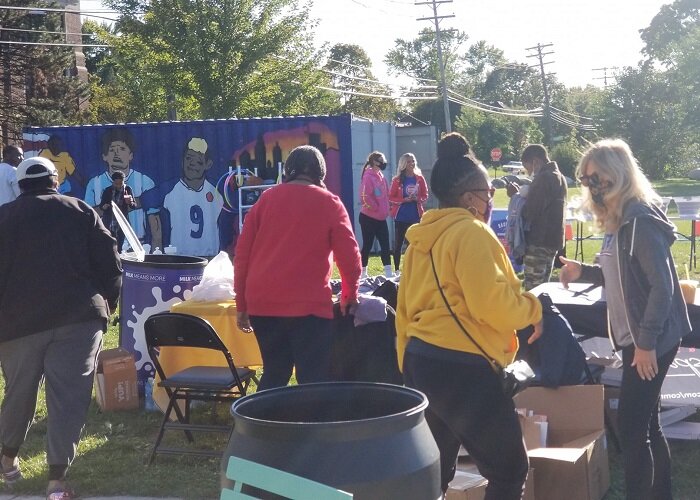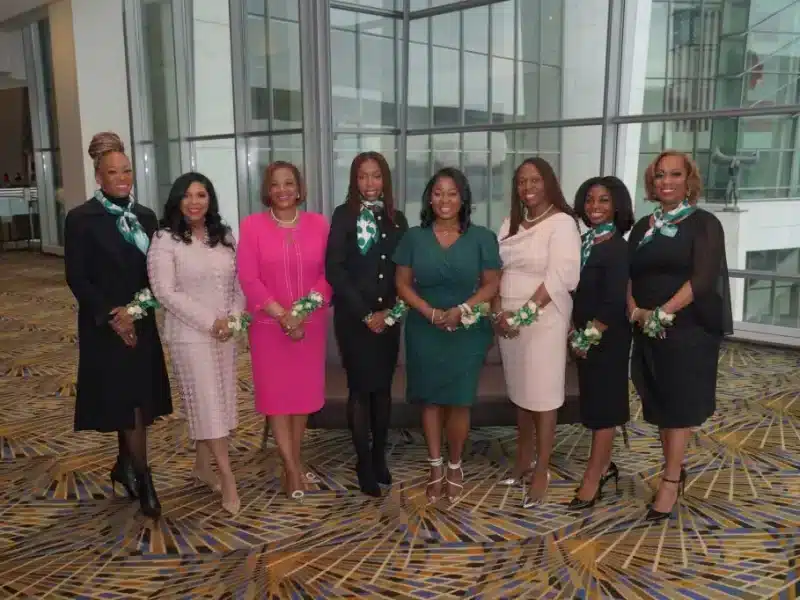Resilient Neighborhoods: How COVID-19 rewrote the rules for community engagement in Detroit
Detroit nonprofits have adopted new strategies to reach communities during the pandemic.
Even though they were not able to be together in-person, residents of Detroit’s Grandmont Rosedale neighborhoods had a lot to discuss earlier this month during a virtual town hall focused on a proposed mixed-use development that could be coming to the city’s northwest side.
Located on the grounds of a former IHOP restaurant at Grand River Avenue and Minock Street, the proposed project site was
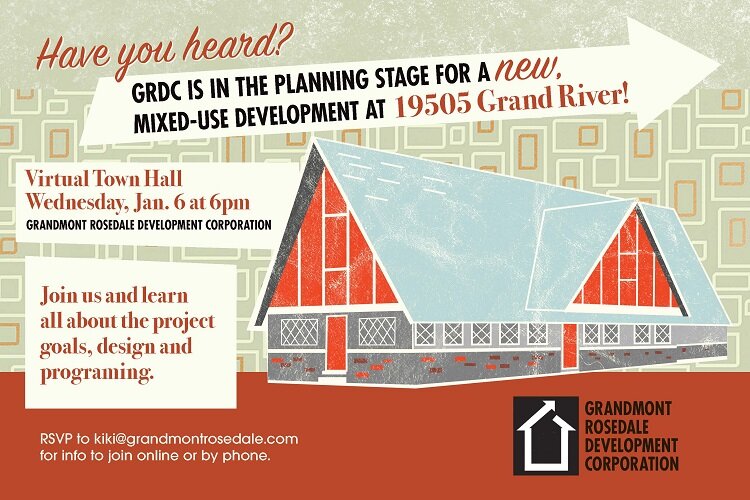
purchased by the Grandmont Rosedale Development Corporation (GRDC) in 2019. The nonprofit is looking into demolishing two buildings at the site and building 36 senior-oriented residential units there, as well as 5,000 square feet of commercial space. That street-level space is being envisioned as a place for a sit-down dining establishment and a community gathering spot. But the project is still very early in its planning phases and would need financing in order to proceed.
The online town hall, which was hosted by GRDC, took place Jan. 6. During the event, community members expressed excitement about the project and asked questions about issues like noise, privacy, and garbage disposal. But just as importantly, concerns were also raised about the awareness and involvement of those living nearest to the proposed project site.
“The neighbors on Minock and Auburn may not realize the scope of this project or the possible inconveniences of a parking lot where a house was,” said Diane Patterson, a Grandmont resident who participated in the town hall. “I want to know that those residents directly impacted have been personally contacted. I think it’s important going forward to be inclusive of all needs.”
Sherita Smith, GRDC’s executive director, told participants of the town hall that that nonprofit had been working closely with the Minock Park Block Association to reach out to residents in the neighborhood and would continue that work.
“[We’ve] actually been in direct contact with the residents on Auburn to discuss our plans,” she said. “We will do our very best to be responsive and to answer whatever questions people have, as well as to take their feedback into our design.”
Virtual and beyond
For groups like GRDC, COVID-19 has certainly altered the dynamics of how they engage with the communities they serve, particularly by encouraging a shift toward online interactions.
“It’s changed pretty dramatically,” says Smith. “[Engaging virtually] has its benefits. Now people who could not attend an in-person meeting … may have more flexibility to be able to hop on a Zoom. And we can record sessions like the town hall and put them on the website or put them on social media.”
In addition to the recent town Hall, GRDC has also held online events for things like resident-led task forces, community planning, and neighborhood safety meetings. What’s more, the nonprofit’s economic development committee — in addition to its regular meetings — holds educational meetings every other month, which are open to the public and offer trainings and informational sessions about development and revitalization efforts. In an effort to keep people’s spirits up, Grandmont Community Association, one of the neighborhood organizations GRDC works with, has even been sponsoring weekly community social hours on Sundays from 4 to 5 p.m. via Zoom.
Still not everyone is able or inclined to stay in touch via online platforms and social media. In addition to its regular newsletter,
“We have to remember there’s COVID going on and a lot of people don’t want to answer. To be honest, I didn’t want to go door-to-door, but it’s something we needed to do. And we will continue to do it going forward.”
the nonprofit has also been mailing out postcards that can be returned with comments to keep in touch with residents. When possible, it’s also sponsored outdoor events that take social distancing and other precautions into consideration. Although GRDC’s annual farmers market was postponed this year, the market did eventually reopen after an initial period where curbside pickup was offered. Neighborhood associations affiliated with the nonprofit have also held outdoor concerts and movie nights to help people connect during the pandemic.
In terms of outreach, it’s hard to replace good old face-to-face contact. So when it came time to start talking about the proposed mixed-use development at the former IHOP site, GRDC decided to do more than simply mail out fliers. In fact, Vicki Holmes, president of the Minock Park Block Association and a GRDC board member, walked the area with her daughter to let the neighborhood know what was going on. Whenever they could, they spoke personally to residents. And when they could not do that, they left fliers. Overall, Holmes found that neighbors supported the project, particularly the demolition of the abandoned home, which has long been a neighborhood eyesore as well as an occasional hangout for squatters.
That said, she acknowledged the challenges of doing outreach during the pandemic, which has made neighborhood canvassing much more difficult than it used to be.
“We have to remember there’s COVID going on and a lot of people don’t want to answer,” she said in a comment during the virtual town hall. “To be honest, I didn’t want to go door-to-door, but it’s something we needed to do. And we will continue to do it going forward.”
Canvassing and collaboration
For the nonprofit advocacy group Congress of Communities (COC), navigating COVID-19 has been a time of adjustment. Based in Southwest Detroit, the nonprofit is dedicated to empowering residents and fostering cross-community collaboration. So the requirements of social distancing have created a barrier to doing the people-oriented type of work that COC is committed to doing.
Earlier this year, Rea Maci, COC’s Building Sustainable Communities manager, Congress of Communities was tasked with

overseeing a community survey for a Southwest Solutions development project in the Michigan-Martin area of Southwest Detroit. The survey, which was fairly comprehensive, dealt with assessing residents’ thoughts about conditions in the neighborhood. COC was tasked with getting responses back from 200 area residents. And because the project got going around the time the pandemic began, COVID had an impact on how the nonprofit conducted its work.
“Originally we had planned to do mail surveys, but the response rate for that would be very low, close to probably 2% of what we sent out,” she says. “Because [Southwest Solutions] wanted it done by the end of September, the fastest thing and the more responsive thing was to go door-to-door.”
After deciding on in-person outreach, COC took a lot of care that its surveyors had the necessary personal protective gear and maintained proper social distancing. But because so many of the canvassers were local who were friendly with many of the residents, Maci also took extra care to ensure that they stayed outside at all times.
“I was taking all these precautions to do it and still get 200 surveys,” says Maci. “I had to be like you can’t go into anyone’s house, and I was driving around to make sure they were visible at all times.”
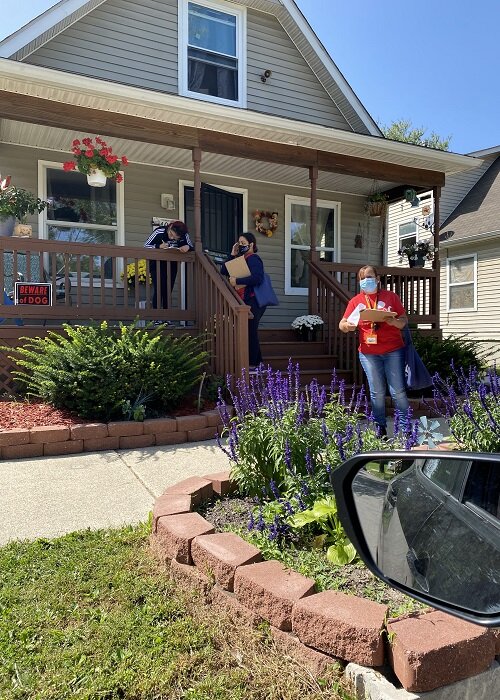
COC also sent its surveyors out in pairs so they’d be safe and coordinated to make sure both English and Spanish speakers were on-hand when needed. Thankfully, residents were responsive to the door-to-door outreach, and COC ended up completing that project in October.
The nonprofit is working on another project to raise the awareness of local youth about skilled trades jobs. That project started before the COVID-19 outbreak and originally involved activities like speaking to local high schoolers in their classrooms. Due to the pandemic, though, COC has shifted these efforts to the virtual realm to things like online roundtables where unions and community groups can interact with students. It’s even considering holding a virtual skilled trade fair in place of the in-person event it had planned.
COC has also been an active part of the coalition that’s been sponsoring the COVID313 Virtual Town Halls. Broadcast on Detroit Public Television’s Facebook page, the town halls provide information, resources, and feedback on a wide variety of topics related to the pandemic.
In addition to dealing with the pandemic, COC is still moving its offices into its new community center. So Maci expects a lot of the nonprofit’s work will be virtual for the foreseeable future. To this end, she’s been learning a lot about the possibilities of a platform like Zoom, which can offer things like online polls and breakout rooms and can even help to host virtual elections. That said, though Maci is still nostalgic for the days when in-person interactions were a whole lot easier.
“I’m hoping it gets better honestly,” she says. “I really can’t wait to be back and see people’s faces. I miss the connection of being with folks and now it seems unreal that we ever actually got to do that before.”
Safety protocols and mutual aid
Edythe Ford certainly knows all about staying in touch with community members, especially during these difficult times. She’s director of community engagement for MACC Development, a faith-oriented nonprofit based on Detroit’s east side.
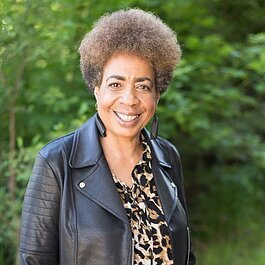
Founded by the Mack Avenue Community Church in 2010, MACC Development is dedicated to serving residents and revitalizing the community in Detroit’s 48214 ZIP code. The nonprofit sponsors a variety of programming, from youth sports to housing renovation, and also operates a combination coffee bar/laundromat/community center called the Commons at 7900 Mack Ave.
For many people in the community, Ford is the go-to person at MACC Development. She helps connect local residents with resources and has traditionally made herself available for people to speak with at the Commons. So when the Commons had to shut down during the early days of the pandemic, it was definitely jarring for her.
She’s especially saddened by the toll this took on the homeless and street people who rely on the Commons for food, hygiene, and emotional support.
“I had to come in in April to give masks out to the neighbors, and these people showed up and they looked so terrible,” she says. “Because we weren’t taking care of them, and a couple of them had died of drug overdoses.”
Eventually, the Commons reopened with new strict cleaning and occupancy protocols in place. According to Ford, about 345 people died of COVID-19 in the 48214 ZIP code at the onset of the pandemic, so it wasn’t difficult to get visitors to wear masks and follow social distancing guidelines.
MACC Development’s door-to-door outreach efforts, which include sharing information on how to avoid foreclosure, were a little trickier to resume, though. Eventually, the nonprofit decided to allow volunteers to get back to door knocking wearing masks, face shields, gloves, and T-shirts over their regular clothes. Their standard procedure is now to knock on a person’s door and then move back to the grass or the pathway in front of their home and wait for residents to come to talk to them.
“That was a hit,” says Ford. “People just started coming out from everywhere. The seniors were all happy. They were all thirsty to talk to each other. And that helped me to get more information out to people about their property tax exemptions.”
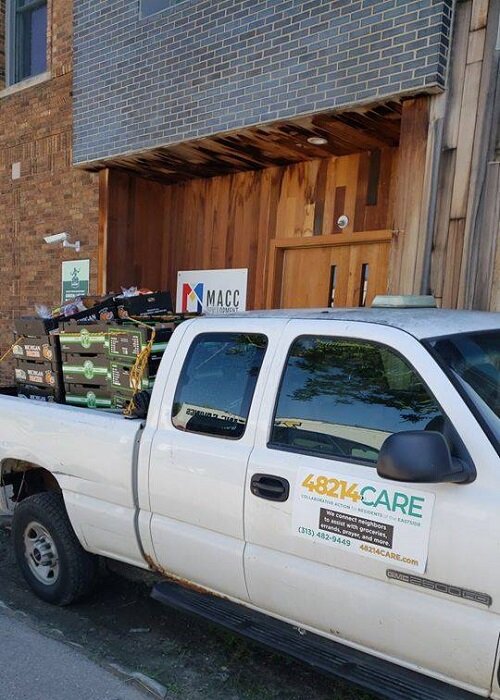
As a direct response to the challenges of the pandemic, MACC Development also started up a program called 48214 Care. The idea behind the program is to connect residents in need with other neighbors, partners, and services who can provide physical, emotional, spiritual, and other types of support. Similar to other mutual aid efforts that have emerged during the pandemic, 48214 Care works by identifying needs, building a database of supporters and organizations that can help and connecting people to meet those needs. The program is geared toward helping community members out with things like groceries, utility assistance, errands, and even rent assistance. In fact, grants administered through 48214 Care are available to help residents who live in that ZIP code make direct payments to cover bills from $300 to $500.
Looking toward the future, MACC Development is planning to host a Clean and Safe Day on Jan. 20. The nonprofit will be giving away 100 laundry baskets, detergent, cleaning supplies, sanitizer, gloves, and information about how to stay clean and safe during the pandemic.
Although MACC Development hasn’t focused much on virtual community engagement so far, it is gearing up to do that later this year. The nonprofit is currently in the process of ordering webinar equipment. In addition to offering its own online programming, MACC Development is also interested in renting its space and equipment to other neighborhood groups who want to put together their own webinars.
While the pandemic has been very challenging, Ford feels it is also an opportunity for community members and organizations like hers to step up their efforts. As a practicing Christian, she compares the struggles people are facing now to the biblical story of Passover, where the Hebrews of the Old Testament had to support one another during a time of plagues and adversity.
“In Detroit, this is our Passover,” she says. “We need to be talking to our neighbors across the fence. We need to make sure that their lights and gas are on … and just be loving on our neighbors, because we don’t know when they could leave us.”
Resilient Neighborhoods is a reporting and engagement series that examines how Detroit residents and community development organizations are working together to strengthen local neighborhoods. It’s made possible with funding from the Kresge Foundation.
